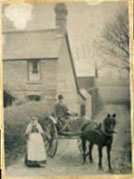
Early Last Century
Llangynhafal in the early 20th-century looked very different to today’s parish. Many of the houses were thatched and there were, of course, no cars in those days, instead horses provided transportation. Miss Dilys Davies and Mrs Ada Jones remember the options available: Mr Evan Roberts had a wagonette, which held ten passengers and left the Golden Lion for Ruthin every Wednesday at 11am, returning at 5pm. It was especially popular during the fruit season when folk sold their produce in town (damsons were 1d or 1/2d per pound). A pony and trap at Pen Stryt and Pen Rhos ran to and from Rhewl station and at Rhos Place Mr and Mrs Griffiths had a donkey and cart, which would take two or three passengers to Ruthin for 2d a head.
To read more about Llangynhafal's history please click here.